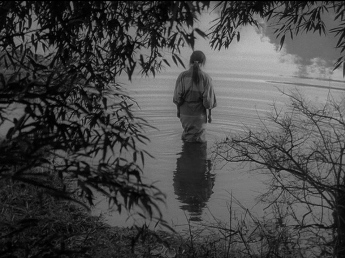Strategic Air Command (1955)
Fans of the Anthony Mann-James Stewart Westerns will likely be disappointed with this patriotic follow-up. Purportedly Stewart himself cooked up this Technicolor, Vistavision tribute to SAC and sold Paramount on the idea. The result is leaden White Elephant effort that retains none of the graphic, abrasive ease that came so naturally to Mann in Winchester ’73. Stewart plays ‘Dutch’ Holland, an air force veteran who finds his post-war prosperity playing third base for the St. Louis cardinals. His wife, June Allyson, is alarmed and puzzled when air force brass call up and cajole Stewart back into the service. There’s no war on, she protests. The rest of the picture is a retrograde exercise in demonstrating that wives say the silliest things and often, as they’re so delicate and trusting, don’t understand that absence of combat actually represents a grave threat to national prosperity. Close your mouth and shut your lyin’ eyes.
Fidelity to Cold War facts circumscribes the dramatic scope of Strategic Air Command. Since Mann and Stewart can’t well bomb Moscow for a rousing climax, they must make invigorating hay out of practice runs and war games and the like. And yet the steadfast patriotic impulse behind the picture ruins these set-pieces: even the wing of an airborne B-36 catching fire can’t faze our stoical Stewart, who calmly suppresses hysteria throughout. Later, upon reuniting with Allyson and glimpsing his newborn daughter for the first time, he proclaims a model of the B-47 to be the most beautiful thing he’s ever seen. It’s an expression of priorities that rhymes perfectly with an earlier scene in which Stewart expresses innocent surprise when Allyson reminds him that she can only become pregnant when he’s on the ground. Strategic Air Command subjugates with received innocence any structure (biological or narrative) that threatens its propagandistic aims. As such, the supporting characters do little more than spout civilian objections to peacetime military build-up, only to have them handily mocked or set aside. Ford’s Wings of Eagles, somewhat similar in its ambition to present the domestic price of a military career, remains superior in every respect.
Rouge (1987)
Stanley Kwan’s breakthrough film Rouge remains a beguiling work some twenty years after its release. Rouge, a star-crossed love story produced by Jackie Chan, is conceivably a crowd-pleaser, though I suspect that it could not succeed as well as it does without that popular framework. The love story at the center comes across as pretty standard stuff—during the 1930s, a glamorous prostitute, Fleur (Anita Mui), falls in love with a client, Chan (Leslie Cheung); they wish to marry but his parents would never approve of such a union; the lovers agree to a suicide pact. Some fifty years later, the ghost of Fleur returns to Hong Kong looking for the ghost of Chan. She meets a yuppie couple who put her up for a few days while she waits. After several failed connections she begins to suspect that Chan reneged on their pact. Fifty years of waiting for a soul mate give way to rueful melancholy.
The love story at the center of Rouge is a slight thing, a standard-issue forbidden romance. Its obstacles never feel particular to this couple or to their period. Yet the film’s generality accounts for a large part of its effect. This is not because the romantic sketch is universal or because it’s mounted scrupulously enough to breathe new life into the material. Instead, Rouge curiously positions the central romance as a nostalgic product—not a real artifact of the past, but instead a token of our impoverished conception of it. Fleur looks out of place in the present, amidst neon advertisements and other emblems of a perplexing global culture. Kwan poses her glamour against the chintzy surfaces of 1987 Hong Kong but never suggests that a retreat into the past could resolve the alienation of his characters. It’s a long, sincere sigh about how much sexier and mysterious the past can seem to contemporary eyes. Kwan doesn’t belittle that impulse, but he doesn’t let it pass without interrogation either. The yuppie couple of 1987 (the Hong Kong cousins of Albert Brooks and Julie Hagerty in Lost in America) share a healthier, flabbier, and ultimately more honest relationship than Fleur and Chan, but such an observation does little to blunt their sense of inadequacy, living in the shadow of a past more imagined than experienced.
Kwan assayed a more mature exploration of these themes in his 1992 masterpiece Actress but Rouge works in its own right as the logical conclusion to the expectations established by its own brand of popular entertainment. Both films, incidentally, work as interesting companion pieces to Resnais’s attempts to resurrect the emotional immediacy of unfashionable theater pieces.
The Conformist (1970)
Bernardo Bertolucci’s famous art house thriller reminds me somewhat of a lesser Makhmalbaf effort like Once Upon a Time, Cinema in its tendency to emphasize ornate and oppressive prettiness over nearly everything else. Vittorio Storaro’s impressive photography oscillates between nouvelle vague eccentricity and a more classical and rigorous brand of ravishment, but the mode throughout suggests a detached exercise in style. Much like Schindler’s List, actually, in its desire to condemn fascism as a political impulse but redeem it as a source of stylish chic, The Conformist is a film divided against itself, perhaps deliberately so. Homosexuality serves as the locus of political complacency, though there’s something here for bigots and gays alike: Trintignant commits his crimes and it’s left up to us to decide whether latent homosexuality or the societal pressures to repress it made him do it.
Subscribe to:
Post Comments (Atom)

No comments:
Post a Comment